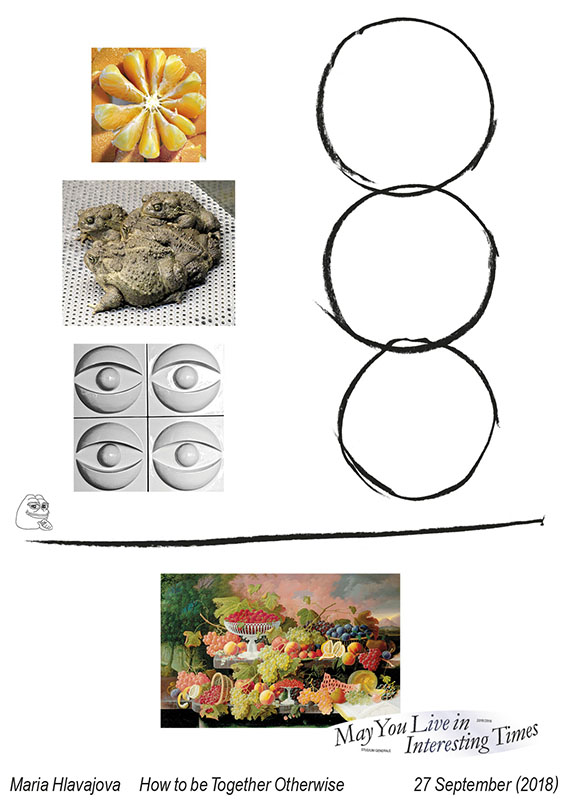
Lecture (2/9) – In her practice as a curator, organizer, educator, and director of BAK, basis voor actuele kunst in Utrecht, Maria Hlavajova has been interested in exploring what she calls the “art in the otherwise.” Committed to art in the public space and political sphere, she has consistently asked the question of how art can help us envision and enact ways of being together. Different from the contemporary world riddled by inequalities and conflicts. In the lecture, Hlavajova will discuss a number of projects that engage these issues, including the current project at BAK titled Propositions for Non-FascistLiving (2017– 2020).
Over the next four years, BAKunfolds its long-term research itineraryPropositions for Non-Fascist Living. Prompted by the dramatic resurfacing and normalization of fascisms, historical and contemporary, and inspired by philosopher Michel Foucault, BAK develops and gathers propositions for an “art of living counter to all forms of fascism, whether already present or impending,” including“ the fascism in us all, in our heads and in our everyday behavior, the fascism that causes us to love power, to desire the very thing that dominates and exploits us.”Through its exhibition, discursive, and performative facets, Propositions for Non-Fascist Living attempts to articulate and inhabit methods of de-individualized living; methods in which multiplicity and difference enact relations other than those enamored with power and hierarchy, endeavoring to both articulate and inhabit options of being together otherwise.
bakonline.org
Maria Hlavajova (LiptovskyMikulas, 1971) is the founder and artistic director of BAK, basis voor actuele kunst, Utrecht since 2000, and artistic director of FORMER WEST (2008–2016), which she initiated and developed as an international collaborative research, education, publication, and exhibition undertaking. Hlavajovahas organized numerous projects at BAKand beyond, including the series FutureVocabularies (2014–2016), New WorldAcademy with artist Jonas Staal (2013–ongoing), and the international research projects The Return of Religion and OtherMyths (2008), On Knowledge Production:Practices in Contemporary Art (2006),Concerning War (2005), and Who if not we should at least imagine the future of all this? 7 episodes on (ex)changing Europe(2004), as well as exhibitions with artists such as Josef Dabernig, Sanja Iveković, Aernout Mik, Artur Żmijewski, Lawrence Weiner, and many others.
Photo by Tarona Leonora

Poster design by Dayna Casey

Maria Hlavajova

Installation by Alexandra Dalavagka and Mirka Kachrimanidou
Sharing Economy
“How to be Together Otherwise”
Maria Hlavajova
For this week’s Stadium Generale work,our main fascination key was the phrase “how art can help us envision and enact ways of being together”. Inspired by the opening of Trixie, an artist’s initiative created by KABK graduates called “Come as you are”, in which the theme of the exhibition was food in various forms and contexts, a way of welcoming the visitors and participants of the opening.
In every part of the world, no matter the continent, nation, culture or colour, there is universal understanding that surrounds the role of food in our lives when it comes to its social role.The action of eating all together, brings people closer, whether those people are friends, a family that reunites after a long day around the dinner table, or strangers who gather up and share from the same table.
In our case we choose to eat around a circle on the floor and not on a table, in order to get rid of all hierarchy and power connotations that are related with the shape of the table, and how people are positioned around it.For example the “head of the table” is usually related to the person of power in the house.We started eating with a couple of friends, in a busy location of the school and as the time went by, more and more students that we did not know were interested in joining us, they became part of the circle and created a collective experience.